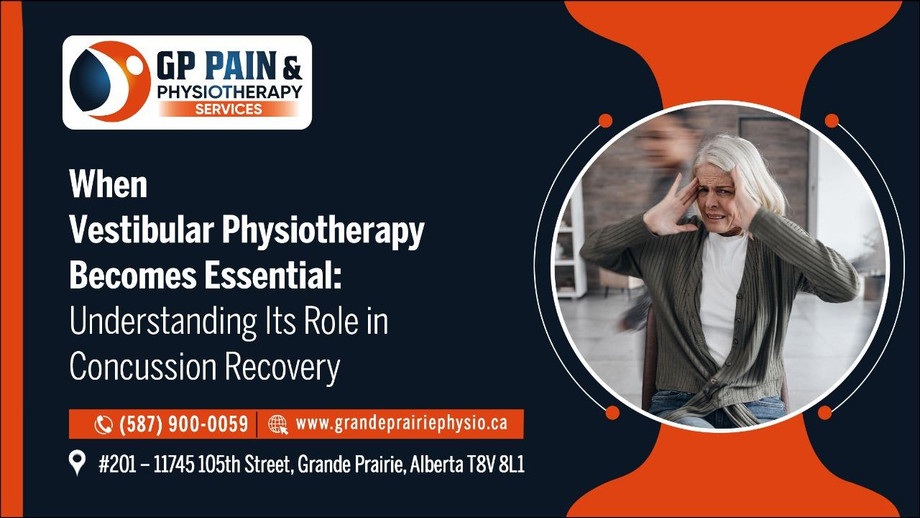Bilateral Vestibular Hypofunction (BVH) is a condition where the balanced organs in both ears do not function properly, leading to symptoms such as dizziness, unsteadiness, difficulty walking in the dark, and challenges with daily activities. For individuals with BVH, everyday tasks can become daunting due to a lack of stability and spatial awareness. Fortunately, vestibular physiotherapy offers an effective pathway to regain confidence, reduce symptoms, and improve quality of life. Vestibular Physiotherapy Grande Prairie At GP Pain & Physiotherapy , we specialize in vestibular rehabilitation tailored to each patient’s unique needs.
Ototoxic Medications: Certain antibiotics or chemotherapy drugs may harm the vestibular system.
Age-Related Degeneration: Natural aging processes can reduce vestibular function over time.
Infections: Severe infections such as meningitis can damage the inner ear.
Autoimmune Disorders: Conditions affecting the inner ear can lead to bilateral dysfunction.
Head Trauma: Injuries to the head may impair vestibular function.
Symptoms of BVH
BVH presents a distinct set of challenges, including:
Chronic Imbalance: Difficulty maintaining balance, especially in low-light or uneven environments.
Dizziness: Persistent or intermittent sensations of spinning or swaying.
Visual Disturbances: Trouble focusing or blurry vision during movement (oscillopsia).
Fatigue: Increased physical and mental exhaustion from compensating for poor balance.
Difficulty Walking: Unsteadiness, particularly when walking on uneven surfaces or navigating crowds.
How Vestibular Physiotherapy Helps
Vestibular physiotherapy focuses on retraining the brain to compensate for reduced vestibular input, thereby improving balance and reducing symptoms. At GP Pain & Physiotherapy, we employ evidence-based techniques to help patients regain stability and independence.
Balance Training
Balance exercises are designed to improve stability and coordination. These may include:
-
Standing on one leg or uneven surfaces.
-
Walking heel-to-toe in a straight line.
-
Performing tasks that challenge balance, such as turning quickly or bending down.
Gaze Stabilization
Gaze stabilization exercises target visual disturbances like oscillopsia by strengthening the connection between the eyes and the vestibular system. Patients practice maintaining focus on a fixed object while moving their head.
Vestibular Adaptation Exercises
Adaptation exercises help the brain adjust to the lack of vestibular input. These involve repeated head movements and visual focus tasks to enhance neural compensation.
Habituation Therapy
For those experiencing dizziness triggered by specific movements or positions, habituation exercises reduce symptoms by gradually exposing the patient to these triggers in a controlled manner.
Strength and Mobility Training
Improving overall physical strength and flexibility supports balance and reduces the risk of falls. These exercises are tailored to each patient’s physical condition.
Benefits of Vestibular Physiotherapy for BVH
Patients undergoing vestibular physiotherapy for BVH often experience significant improvements, including:
Enhanced Balance: Greater stability in daily activities and reduced risk of falls.
Reduced Dizziness: Fewer episodes of dizziness and oscillopsia.
Improved Mobility: Greater ease in walking and navigating challenging environments.
Restored Confidence: Ability to engage in social and recreational activities without fear of imbalance.
Better Quality of Life: Increased independence and reduced reliance on assistive devices.
Your Journey at GP Pain & Physiotherapy
At GP Pain & Physiotherapy in Grande Prairie, we recognize that each patient’s experience with BVH is unique. Our approach includes:
Comprehensive Assessments: Detailed evaluations to understand the extent of vestibular dysfunction and its impact on your life.
Customized Treatment Plans: Tailored exercises and therapies designed to address your specific symptoms and goals.
Education and Support: Guidance on managing symptoms, improving safety at home, and understanding the condition.
Collaborative Care: Communication with your healthcare team to ensure a cohesive treatment approach.
What to Expect
During your initial consultation, a physiotherapist will assess your vestibular function, balance, and overall health. Treatment sessions will include targeted exercises, progress tracking, and adjustments to ensure continuous improvement. With consistent effort and professional guidance, most patients notice significant symptom relief and improved functionality over time.
Empowering Recovery and Independence
Living with BVH can feel overwhelming, but vestibular physiotherapy offers hope and tangible solutions. By addressing the root causes of imbalance and retraining your body and mind, you can regain control and confidence in your daily life.
At GP Pain & Physiotherapy in Grande Prairie, we are dedicated to helping you achieve these goals through compassionate, expert care. If you’re struggling with BVH or other balance-related challenges, contact us today to schedule an assessment and take the first step toward recovery.
Don’t let BVH dictate your life—reclaim your balance and independence with the support of our specialized physiotherapy team.
#vestibularphysiotherapygrandeprairie #vestibularphysiotherapy #vestibularphysiotherapynearme #vestibularphysiotherapy #gppainphysicaltherapy #grandeprairiephysiotherapy #physiotherapynearme #physiotherapygrandeprairie #physicaltherapygrandeprairie #physicaltherapynearme #physicaltherapy #physiotherapistclinic #physiotherapytclinic #physicaltherapyclinic #vestibularrehabilitation
#vestibularrehabilitationtherapy #vertigophysiotherapy #dizzinessphysiotherapy

